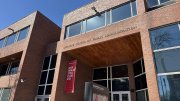As the Omicron variant spread at year-end, Harvard announced a rapid-fire set of measures to control community transmission. Highlights follow.
December 18: January-term activities were moved to remote status, to reduce the campus population from the end of fall exams until the scheduled January 24 beginning of the spring term—effecting a break that might slow the Omicron surge.
December 30: Public spectators were excluded from athletic events through January 23.
January 5: Faculty of Arts and Sciences dean Claudine Gay committed to resuming academic operations January 24, but with enhanced precautions—limiting indoor social gatherings, and requiring masking, for at least the first two weeks of the term; replacing sit-down dining with grab-and-go food service during those first two weeks; and continuing to require instructors to be masked in the classroom.
January 12: University Health Services executive director Giang T. Nguyen informed the community that in light of the surge—weekly average cases had risen from 52 during the fall, when the campus was fully populated, to 970 in early January, when far fewer people were present—the sheer number of cases required additional adaptations. Given a 97 percent vaccination rate (and Harvard’s booster mandate), infections were proving far less dangerous than earlier in the pandemic. Accordingly, “Individuals who test positive should identify and notify their close contacts,” as “HUHS will no longer be doing this due to high volume.” Masking is to be upgraded to high-quality, surgical-style, disposable units, or a KN-95 layered under a form-fitting fabric mask.
January 13: The College advised students that effective the next day, those who test positive would now “isolate in place,” rather than separately, as before. If a direct roommate tests positive, students can apply for alternative housing, but such accommodations are “very limited.” Students returning to campus would be required to undergo pre-arrival PCR virus testing, to use rapid antigen tests in their rooms, and then take an arrival PCR—before resuming their regularly scheduled PCR testing.
January 18: Central administration staff, expected to begin limited return to work on campus January 24, were advised to delay doing so until mid February. The College advised teachers that instruction could be remote during the first week, when large numbers of cases, and isolating students, were expected—but thereafter must be in person unless the number of students in isolation at one time renders such instruction infeasible.
Welcome to the spring semester.








